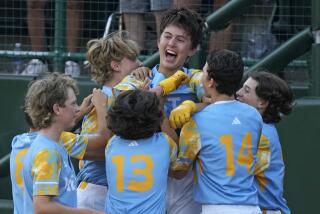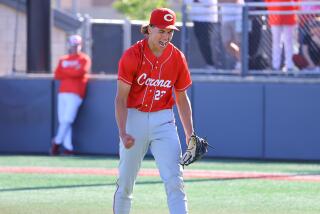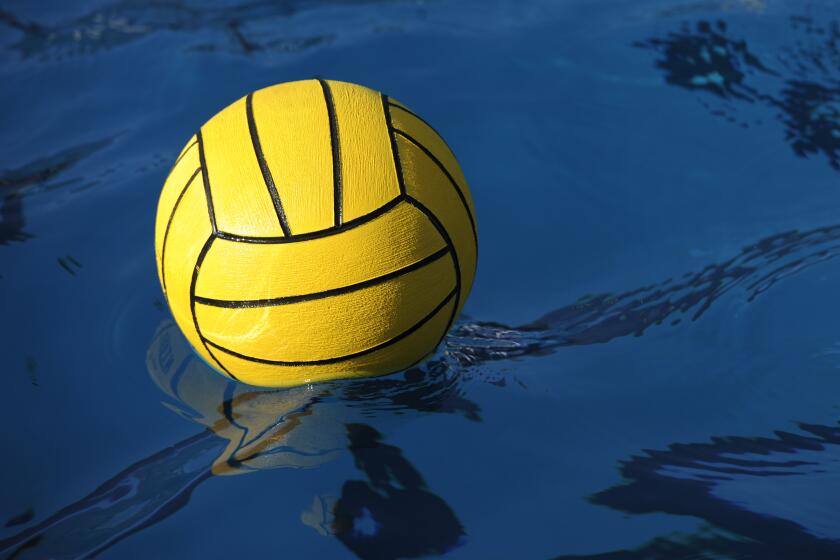Built to Last
Wanting to show up the official in front of the small gathering at El Segundo High, George Brett laughed in disgust after being whistled for a ticky-tack foul during a junior varsity basketball game.
Sitting in the gym that winter day in 1969 was El Segundo’s baseball coach, John Stevenson, who waited until the first day of baseball practice to lambaste his rising sophomore star for the display of disrespect.
“You’ll never do that here,” Stevenson barked. “You will respect the game.”
Over his 43-year career, spent entirely at El Segundo, Stevenson has 904 victories, the most of any high school baseball coach in California. Yet, his biggest achievement has been the way in which he has preached the fundamentals of baseball and citizenship, emphasizing responsibility on the field and in the community.
Along the way, Stevenson has instilled in his players his unbridled passion for a game that has kept him youthful at 68, charging out his front door with a sense of urgency for the six-block walk to Recreation Park, where El Segundo plays its home games.
“He taught me to respect the game and to always play hard,” said Brett, who went on to a Hall of Fame career with the Kansas City Royals. “I think that’s why I ended up playing 20 years in the major leagues. I had more fun than anyone else, and it started with high school.
“I got used to winning and expected to win every time I went out on the field.”
Winning has also been a constant for Stevenson, whose teams have won six Southern Section and 27 league titles, but it is only a small part of his story and he would like to keep it that way.
In 1988, when third base coach Gregg McMullin informed Stevenson of a milestone victory by telling him he had reached 600, he responded by asking, “Six hundred what?”
Typical Stevenson. Always quick to deflect attention and spread praise all around.
“I just don’t want to take sole credit for something that so many other people had a major hand in,” Stevenson explained. “I didn’t do this. I was the person who was fortunate enough to be in the position to have these things delivered to me.”
Stevenson attributes much of his success to El Segundo, a tight-knit beach community of 16,033 recognized as much for its love of baseball as its long-standing association with the Chevron refinery that borders the city on the south.
The small town has produced a disproportionate number of talented baseball players who developed their skills through the equivalent of a minor league farm system. Before reaching high school, they have been schooled in the fundamentals by wildly successful Little League and Babe Ruth League programs.
“It’s like I get the polished product that has been nurtured since T-ball,” Stevenson said.
Those who have followed Stevenson’s career say he is a master tactician who hasn’t achieved 900 victories by simply tossing out bats and balls.
“It might sound easy, but you have to get the right guys in the right spots,” said West Torrance Coach Harry Jenkins, Stevenson’s longtime nemesis. “You also have to mold talent. He’s consistently done that more than anybody.”
Stevenson has transformed average players into good players and good players into great players by simple means, such as hitting infielders 150 balls a day. He has also mastered his players’ psyches, tearing them down by making them run sprints after mental gaffes only to pump them back up by embellishing their abilities.
“The key is making players believe they can play, even though they might not be as great as their parents think they are,” said El Segundo assistant Craig Cousins, who played on two section championship teams under Stevenson in the 1960s. “He’s always had the ability to say, ‘You’re my first baseman. You’re not coming out.’”
Stevenson’s teams have averaged 21 victories a season, but glory has been elusive in recent years. The Eagles finished the season Thursday with a 9-6 victory over Culver City, raising their record to 13-15 but saddling Stevenson with consecutive losing seasons for the first time in his coaching career.
The losses do more than lower Stevenson’s career winning percentage of .721, said his wife of 32 years, Gail.
“They eat at him,” she said. “He thinks about what he could have done differently. He’ll come home afterward and ask, ‘What do you think the turning point in the game was?’ He mulls it over in his mind.
“The team used to play on Tuesdays and Thursdays, and if it lost, you hoped it was on a Tuesday because you only had to hear about it for one night. If it lost on Thursday, you had to hear about it until the next week.”
Gail didn’t endure much second-guessing during the 1971 season, widely considered to be Stevenson’s best. That team, featuring Brett and record-setting pitcher Scott McGregor, went 33-2 and captured Stevenson’s third section title.
But it didn’t feature the best of the four Brett brothers, at least at the high school level. That distinction went to Ken Brett, a pitcher and outfielder who was the 1966 section player of the year. Stevenson called him the best player to come out of the South Bay during his tenure.
“When Ken pitched, you worried until you got your first run,” Stevenson said. “Then you started thinking about where you were going to dinner.”
Stevenson’s favorite championship was the one he won with his son Eric at Dodger Stadium in 1989. It is the one topic that brings tears to the coach’s eyes and makes his son’s voice quaver with emotion.
“To actually do it, and hug my dad after we won, was a phenomenal feeling,” said Eric, 30, a supervisor of human resources for a telecommunications company in El Segundo.
The elder Stevenson is celebrated as much for his fairness and integrity as he is for his championships. After El Segundo played poorly in a victory over now defunct Lennox High, the Eagles returned to Recreation Park to drop off their equipment. As the team bus pulled up to the stadium, Stevenson ordered his players to run sprints to atone for their sloppy play.
Players rose from their seats only to be startled when the team captain shouted, “Sit down!” The captain turned to Stevenson and argued that a win was a win and that the Eagles shouldn’t be punished.
“To John’s credit,” Cousins recalled, “the captain won.”
Stevenson has also drawn praise for a time he refused to back down. After El Segundo reached the section’s major-division title game in 1979, section commissioners told Stevenson they wanted the Eagles to play the final against Oxnard Hueneme at Pepperdine because they felt fans wouldn’t drive to Anaheim Stadium during a gas crisis.
After a few days of haggling, the commissioners agreed to allow the game to be played at Anaheim Stadium but moved the starting time to the afternoon so that two lower-division teams could play in the coveted nightcap to draw a bigger crowd.
Immediately after El Segundo won, 5-0, Eagle and Hueneme players gathered to unfurl a banner with a picture of a trophy and a message telling section commissioners to “sit on it.” Stevenson left the trophy on the field in a spur-of-the-moment protest.
“That was a very important statement that was made,” Stevenson said. “We had to stand up for our players, because our players had earned the right to play in that stadium.”
El Segundo didn’t get the trophy back until two years later.
For all his success, Stevenson has never entertained offers to coach elsewhere. “El Segundo, for me, is as good as it gets,” he said. “I guarantee I enjoy my coaching wins and practices just as much as Mike Gillespie does at USC.”
Much has changed since the Manhattan Beach native who attended Redondo Union High and UCLA took over the El Segundo program in 1960. Stevenson has been around for so long now that senior catcher Steve Eno calls him “the Lord.”
Two of the most significant changes Stevenson has witnessed have been the advent of the aluminum bat and the proliferation of weightlifting programs and specialized instruction. Stevenson labored without an assistant coach until 1973.
Still, he misses the old days on occasion.
“You used to be able to just outwork other teams,” Stevenson said. “You could overachieve with your team because you had put in harder work, longer hours. Today, I don’t know that you can do that.”
Stevenson still puts in his fair share of work, but those who have followed his teams over the years say he is slowing down. A heart attack coupled with quintuple-bypass surgery in 1991 made the white-haired coach rethink his priorities, and suddenly he questioned whether baseball still topped his list.
He started delegating more to his assistants, who noticed that he had lost a little of his fire.
Stevenson said he has no intention of retiring.
“As long as they’ll have me and as long as my health is good and my fungo bat holds out, I’ll be here,” he said.
George Brett is among those who hope Stevenson can close the gap on Gene Schultz, the nation’s all-time winningest coach with 1,299 victories and counting at Lansing (Iowa) Kee High.
During his 1999 Hall of Fame induction speech in Cooperstown, N.Y., Brett thanked Stevenson for teaching him how to be a winner. Later, after the cameras stopped rolling, he turned to his old coach and thanked him for much more.
*
(BEGIN TEXT OF INFOBOX)
Major Accomplishments
More to Read
Get our high school sports newsletter
Prep Rally is devoted to the SoCal high school sports experience, bringing you scores, stories and a behind-the-scenes look at what makes prep sports so popular.
You may occasionally receive promotional content from the Los Angeles Times.







